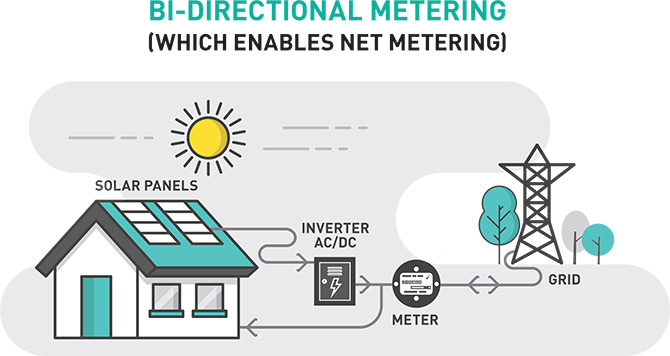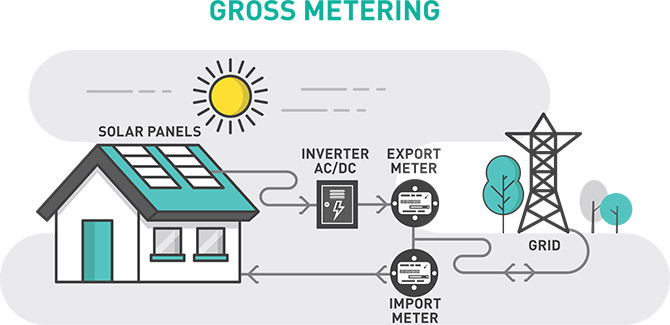The electricity bills you receive at the home, office, or other buildings, are tracked by an electricity meter to make the acquaintance of the units of electricity you consumed.
Generally, for our daily usage, we use the electricity from the power grid and from there, we’ll get the power consumed charge. But, if you have the capacity to produce electricity at your premises itself, then the mechanism of the power grid changes.
Solar roof-mounted PVs has become a standard system for generating a secondary source of power for users. As electricity storage is expensive, these systems are often connected to the grid to export surplus electricity to the grid, and deficits can be imported from the grid.
With the help of advanced technologies, governments, when designing the regulations for solar rooftop systems, introduced two arrangements – Net and Gross Metering.
![]()
![]()
![]()
![]()
![]()
![]()
Let’s discuss these two arrangement systems in detail:
![]()
![]()
![]()
![]()
![]()
![]()
How Net Metering Works


The Net Marketing policy was introduced in India in 2015 to make solar energy more attainable and economical. In this system, the solar energy users get credits for the power that they add to the grid. When solar panels produce excess power, that power is sent to the grid. In addition, this power can be taken back when the solar plants are not functioning.
The process works to connect the solar power systems to the efficient grid via the user’s main service panel. If more power is generated at the property than required, the power metre returns the excess electricity to the grid, reversing the meter from its usual direction.
Thus, a bi-directional meter is needed to aid net metering. Since the meter performs in mutual directions – one way to measure the power acquired (import) and the other to measure power returned (export) to the grid – the consumer finally needs to pay only the “net” of both transactions (as per the state policy).
![]()
![]()
![]()
![]()
![]()
![]()
![]()
![]()
![]()
![]()
![]()
![]()
How Gross Metering Works


In Gross Metering, you cannot directly use the power generated by the solar panels. It gets exported entirely to the power grid, and the electricity required will be delivered from there.
It is an arrangement in which the user is compensated at a fixed feed-in-tariff of the total number of solar energy generated, exported to the grid and has to pay the electricity distribution company at retail supply tariff for the electricity consumed from the grid.
In this case, your billing for consumption will continue to be the same as per your monthly usage. Here, you’ll get paid for the electricity you produce separately. Gross metering is more beneficial for those property owners who have ideal space and don’t need to generate solar power for their own consumption.
They can install a solar system to utilise the space and export the entire generated energy to the grid in exchange for financial benefit. The consumer is compensated for the electricity exported to the grid according to the state commission.
![]()
![]()
![]()
![]()
![]()
![]()
Which one should you consider?
As we discussed, there are different systems for metering the solar system. It’s about your requirement, and your convenience of usage determines which one to use.
In both schemes, you will be required to sign a PPA (Power Purchasing Agreement) with the Distribution Company. Once you are satisfied and make the final decision, you’ll sign a valid legal agreement.
Let’s take an example of Bangalore Electricity Supply Company that has the net metering valid for up to 25 years. The type of metering system you choose will depend on the size of your rooftop solar systems and existing endorsement.
You need to make the decision based on your power usage. As it is a long-term investment, it can be considered an asset, and in the long-term plan, you’ll get a better financial benefit with the help of these systems.
The governments are also introducing new policies and better subsidies for solar users. Therefore, it would be an excellent investment for you in future prospects.



